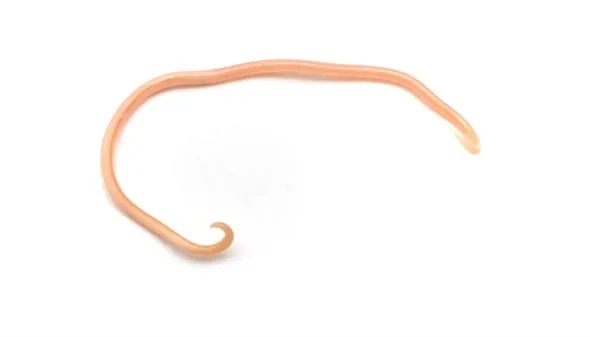Roundworm infections, specifically toxocariasis, are a significant concern for pet owners as they represent a zoonotic disease – one transmissible from animals to humans. Dogs and cats serve as the primary hosts for the roundworm species most commonly implicated in human illness. Understanding how these parasites spread is crucial for safeguarding both your pets’ and your family’s health. This article delves into the life cycle of roundworms, how they transmit to humans, and the essential preventive measures.
Roundworms, belonging to the nematode (ascarid) family, reproduce within the intestinal tract of their hosts. Toxocara canis is the species found in dogs, while Toxocara cati infects cats. The global presence of canine and feline populations means these parasites are found worldwide. Toxocara canis is a more frequent cause of human infection than its feline counterpart.
 Roundworm eggs in dog feces
Roundworm eggs in dog feces
The roundworm life cycle commences when eggs are expelled in feces and deposited into the environment, typically soil. It requires a period of two to four weeks for these eggs to mature and become infectious. A new host becomes infected by ingesting these contaminated eggs. Once ingested, the eggs hatch, releasing larvae that actively penetrate the walls of the small intestine. From the intestine, these larvae enter the bloodstream, allowing them to travel and reach various organs throughout the body.
In their natural host, the roundworm completes its life cycle by migrating back to the small intestine, where they develop into adult worms. This entire developmental process, from hatching to maturity, takes approximately 60 to 90 days. Adult worms then mate, producing eggs that are subsequently eliminated in the feces, thereby restarting the cycle. The incubation period for the eggs can be extended in cooler temperatures, and in colder climates, the eggs may remain dormant throughout the winter months.
The Complexities of Human Infection
Humans are not the natural hosts for Toxocara canis and Toxocara cati. While there is a distinct human roundworm species, Ascaris lumbricoides, infections from this parasite are less common than those originating from cat and dog roundworms. Ascaris lumbricoides primarily affects regions with inadequate sanitation.
 Human infection by Toxocara larvae can lead to serious health issues if not managed properly.
Human infection by Toxocara larvae can lead to serious health issues if not managed properly.
When humans ingest the larvae of cat or dog roundworms, they can become infected. The resulting illness stems from the larvae migrating through various organs and tissues within the human body. A significant concern is Ocular Larva Migrans (OLM), an illness that occurs when larvae invade the eye, potentially leading to blindness. Visceral Larva Migrans (VLM) is another serious condition caused by roundworm larvae that migrate to internal organs or the central nervous system.
Crucially, the larvae of Toxocara canis and Toxocara cati do not mature into adult worms and reproduce within humans. Consequently, humans do not transmit these specific roundworm infections to one another. The primary risk of transmission comes directly from infected animals or their environment.
Transmission Pathways Through Pets and Beyond
Toxocara parasites can also be spread through other animals, known as paratenic hosts. If another animal, such as a rodent, consumes infective eggs, the eggs hatch, and larvae develop. These larvae can continue their development into adult worms when the paratenic host is subsequently preyed upon by the primary host – a cat or a dog.
In puppies, T. canis completes its life cycle, with adult worms producing new eggs. However, in older dogs, the parasitic development can arrest at the second of four larval stages, allowing the larvae to persist in the host for extended periods. Unless dogs are maintained in a strictly toxocara-free environment, reinfection is a common occurrence.
A critical aspect of transmission is that during pregnancy, dormant larvae in the mother dog can reactivate and migrate through the placenta, directly infecting the developing fetus. This is why puppies are often born with toxocara infections and pose a high risk of transmitting these worms to humans if not promptly treated. Furthermore, Toxocara can also be passed to puppies and kittens through their mother’s milk.
The most common source of infection for humans, particularly children, is through contact with soil contaminated with toxocara eggs. Children playing in areas where pets defecate and urinate, and then engaging in activities like putting their hands in their mouths, are at elevated risk.
Preventive Measures for a Healthier Home
To significantly reduce the transmission of toxocara roundworms to humans, a multi-faceted approach is essential:
- Good Hygiene Practices: Thorough handwashing after handling pets, gardening, or playing outdoors is paramount.
- Regular Deworming: Consistent de-worming of pet dogs and cats as recommended by your veterinarian is a critical step in preventing parasite buildup and shedding.
- Environmental Control: Keeping pet areas clean and ensuring dogs and cats are kept out of children’s play areas can minimize exposure to contaminated soil.
- Veterinary Consultation: Regular veterinary check-ups for your pets are vital for early detection and treatment of parasitic infections.
By understanding the life cycle and transmission routes of roundworms, and by diligently implementing preventive measures, pet owners can create a safer environment for both their beloved companions and their families.
Sources
- American Association of Veterinary Parasitologists (AAVP)
- Centers for Disease Control and Prevention (CDC) – Parasites: Toxocariasis
